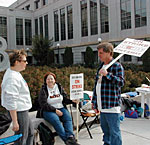State, unions see issues very differently
October 2, 2001
| |
|
|
|
||
Gov. Jesse Ventura and his negotiators stand by their contention that thousands of state workers walked off their jobs Monday demanding millions of dollars more than the state could afford.
"We are far apart and we believe some of (the unions') expectations are unreasonable," said Julien Carter, commissioner of employee relations.
As strikers walked picket lines statewide, there was little to point to a resumption of negotiations that were broken off late Saturday.
Carter invited union leaders to discuss different ways to allocate the state's current offers, but made clear that no new resources would be put on the table - at least for now. The unions flatly rejected returning to bargaining unless the state ups its offers.
Carter said the unions' demands total $142 million in increased pay and benefits, on top of $163 million the state already offered. State offers, he said, are based on reallocating nearly 4 percent of agency budgets to payroll.
Leaders of the Minnesota Association of Professional Employees and the American Federation of State, County and Municipal Employees Council 6 say state leaders are reaching too deep into workers' pockets to keep down the cost of government.
But the two unions' specific grievances are different.
AFSCME, with 19,000 workers in mostly clerical, maintenance and custodial jobs, objects most to the state's health insurance proposal. It would hit employees with new out-of-pocket treatment costs that could reach $3,800 a year in 2003.
Peter Benner, Council 6 executive director, said that could amount to 25 percent of take-home pay for a worker earning AFSCME's $30,000 average annual pay.
State officials, however, say that a worker with the lowest-cost package would have to make dozens of hospital visits to incur the maximum co-pays and deductibles.
Under the state's current plan, the only co-pays are $10 or $21 for prescriptions. Employees pay nothing for any treatment. They also pay premiums ranging from nothing for low-end single coverage to about one-third of the cost of high-end family coverage.
Under the new proposal, employees would pay no premiums for single coverage and $600 a year for family coverage. Under the high-end plan, however, they would pay $400 per hospital admission and up to $600 for other services.
State officials say radical change is necessary to contain health costs that soared 19.3 percent this year and are projected to jump 10.5 percent more in 2002.
Leaders of MAPE, which represents 10,500 workers, say they are close to agreement on health insurance after the state reconfigured some co-pays at their request. With average salaries of nearly $50,000 a year for their technical, accounting and program
management jobs - and some making as much as $87,000 - MAPE members wouldn't feel as great a pinch from new out-of-pocket health costs. MAPE's key issue is pay increases. The state's first offer was for 2 percent annual raises this year and next - well below prevailing wage settlements, the Twin Cities' 4.2 percent inflation rate and the 3 percent raises last offered to AFSCME.
As talks neared the strike deadline, the state changed its MAPE offer to a single 4 percent raise to take effect in January, six months into the two-year contract period. Without the compounding effects of separate 2 percent increases, employees would get slightly less money over two years and a slightly lower base from which to negotiate in 2003.
(Copyright 2001 by The Associated Press. All Rights Reserved.)

